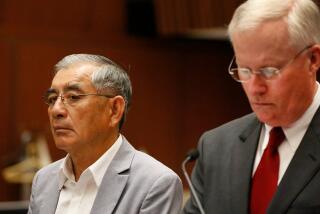Cranston to Pay Penalty for Campaign Violations
- Share via
WASHINGTON — Sen. Alan Cranston (D-Calif.) has agreed to pay a $50,000 civil penalty to the Federal Election Commission for numerous violations by his 1984 presidential campaign committee, including receipt of excessive contributions from his sister and a number of businessmen.
FEC spokesman Fred Eiland said Thursday that the penalty is the third highest ever paid by a federal candidate, ranking behind the $368,500 and $68,000 paid by former Democratic presidential nominee Walter F. Mondale for separate offenses in his 1984 campaign.
Cranston’s committee had previously paid a $1,500 penalty for failure to disclose certain debts, as required by federal campaign law.
Lawyers for Cranston negotiated the latest penalty in a “conciliation agreement” reached after the senator decided against fighting the FEC allegations in federal court.
In related agreements involving excessive contributions to the Cranston campaign, Los Angeles investor Mark R. Weinberg agreed to pay a penalty of $17,000; Marazul Tours Inc., of New York agreed to pay $900, and a man identified only as David D. Miller agreed to pay $375.
In a statement, Cranston attributed his committee’s violations to the difficulty of having to comply with “meticulous regulations” in the heat of a campaign.
“I was not involved in the day-to-day administrative details of my presidential campaign,” he noted. “But as the candidate, I take full responsibility for the actions of my campaign, and I deeply regret the violations of the rules.”
William M. Landau, a New York accountant who served as treasurer of the Cranston for President Committee, played down the offenses as “book-keeping violations.”
“Each one of the five basic violations, according to the FEC, was not significant,” Landau said in a telephone interview. “But the fact that there were five was significant.”
The FEC alleged these infractions:
- The Cranston committee accepted contributions from 77 individuals who gave more than the $1,000 allowed by law and from a maritime union’s political action committee that gave more than the $5,000 limit.
Landau said that when the committee discovered the violations, it either reimbursed the money or attributed the excess contributions to spouses of the donors, an allowed practice.
- The committee accepted excessive contributions in the form of letters of credit from Marazul Tours, five businessmen and Cranston’s sister, Eleanor C. Cameron. The letters, totaling $101,000 and never disclosed on campaign reports, were used as security deposits to telephone companies.
“We paid all of our bills and none of the letters of credit was ever used,” Landau said.
- Weinberg gave the committee $45,000 that he claimed represented profits he had earned by investing $9,000 of the committee’s money in commodities trading. The FEC determined that all of the “profits” were from personal funds.
Landau said the committee returned the money after reaching the same conclusion.
- Cranston exceeded the $50,000 limit on personal spending by charging nearly $118,000 on his American Express card for campaign expenses and donations to the committee.
Landau said that this could have been easily avoided by putting many of the expenses on staff members’ credit cards.
- The committee spent nearly $107,000 more than allowed in the Iowa Democratic primary.
Landau said this violation forced the committee to return $32,000 in federal matching funds to the U.S. Treasury.
More to Read
Get the L.A. Times Politics newsletter
Deeply reported insights into legislation, politics and policy from Sacramento, Washington and beyond. In your inbox twice per week.
You may occasionally receive promotional content from the Los Angeles Times.










